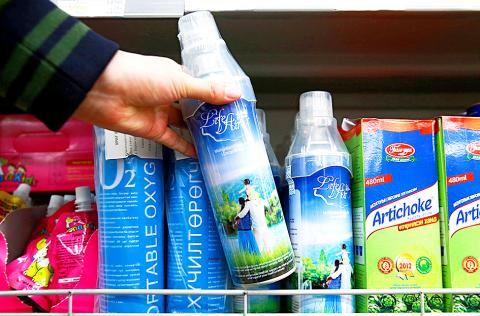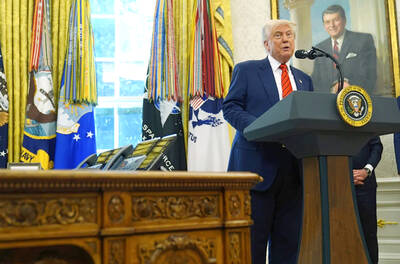Fed up with the smog in Mongolia’s capital, Ulan Bator, residents have resorted to sipping “lung” tea and “oxygen cocktails” in a desperate bid to protect themselves from pollution, despite health officials saying there is no evidence they work.
The city in 2016 topped New Delhi and Beijing as the world’s most polluted capital, UNICEF said in a report warning of a health crisis that has put every child and pregnancy at risk.
With residents of so-called ger (“slum”) districts using coal stoves to cook and heat their homes in the world’s coldest capital, where temperatures can dip as low as minus-40°C, pollution has skyrocketed.

Photo: AFP
While most of the pollution comes from the stoves, transport and power plants add to the mix.
On Jan. 30, air pollution was 133 times higher than the safe limit set by the WHO.
UNICEF reported that cases of respiratory infections have nearly tripled and pneumonia is now the second leading cause of death for children under five.
Worried parents have held protests to press the government to take action.
However, some businesses are cashing in, even though a WHO official has said there is no evidence that such anti-smog products work.
Advertisements in Mongolia boast that “drinking just one oxygen cocktail is equal to a three hour walk in a lush forest.”
At the produce section of the State Department Store, blue cans of oxygen called “Life Is Air” are on sale for US$2 and promise to turn a glass of juice into a foamy, sweet “oxygen cocktail” after spraying some into a glass through a special straw.
Other stores and pharmacies have oxygen cocktail machines that resemble coffeemakers and can turn a juice into a frothy drink for US$1.
Pregnant women are among the most avid customers of the Russian-made product, with some saying they are following their doctor’s orders.
Batbayar Munguntuul, a 34-year-old accountant and mother of three, drank oxygen cocktails when she was pregnant, but she ended up spending much more money on medicine.
“Every winter we constantly buy medicine,” she said. “It has reached a point that it is like just any other grocery product that you have to buy regularly.”
Like many other Mongolians, she has chosen to buy an air purifier to make sure her family breathes clean air at home. Her machine, which filters out toxic fumes, cost US$300.
The average level of PM2.5 particles was 75 micrograms per cubic meter last year, or three times the exposure recommended by the WHO for a 24-hour period.
Air pollution has been linked to asthma, bronchitis and other long-term respiratory diseases.
Some Mongolians drink special teas, named Enkhjin, Ikh Taiga and Dr Baatar, that claim to clean lungs.
Dr Baatar chief executive Baatar Chantsaldulam said sales surge by 20 to 30 percent during winter, when pollution tends to reach its peak.
“First it takes all the toxins out of the blood, then it turns the toxins in the lung into mucus, and all the plants in tea helps boost the human immune system,” he said.
However, Maria Neira, the head of the WHO’s public health department, said the real solution to protect the lungs and the cardiovascular system is to reduce air pollution and avoid exposure to it.
“The business community will offer plenty of those solutions,” Neira said. “We don’t have any scientific evidence whether they provide any benefit.”
Non-profit organizations, such as Parents Against Smog, have said the government is not doing enough to reduce air pollution.
“For the past 10 years, people have known that air pollution has reached dangerous levels,” Parents Against Smog coordinator Tumur Mandakhjargal said. “However, policymakers only address the issue by talking about passing out clean stoves and clean coal.”
The organization has said the government should give about 200,000 ger residents access to loans so they can install heating insulation and replace their stoves with cleaner heaters.
The government spent US$120 million between 2008 and 2016 to combat pollution, with half of the funds coming out of its foreign aid revenue.
Part of the money has gone to distributing low-emission stoves to residents of ger districts.
Last year, parliament approved a tax exemption for companies that sell air purifiers, while Mongolian Prime Minister Ukhnaa Khurelsukh issued an order to distribute US$1.6 million worth of the appliances to all schools.
However, Smog and Kids representative Tumendalai Davaadalai said air purifiers were not the answer to the problem.
“Mobile air purifiers don’t give oxygen, they’re not plants. The decision by Khurelsukh’s Cabinet to distribute air purifiers is a very bad decision,” Davaadalai said. “They are just funding businesses without any positive results.”

A new online voting system aimed at boosting turnout among the Philippines’ millions of overseas workers ahead of Monday’s mid-term elections has been marked by confusion and fears of disenfranchisement. Thousands of overseas Filipino workers have already cast their ballots in the race dominated by a bitter feud between President Ferdinand Marcos Jr and his impeached vice president, Sara Duterte. While official turnout figures are not yet publicly available, data from the Philippine Commission on Elections (COMELEC) showed that at least 134,000 of the 1.22 million registered overseas voters have signed up for the new online system, which opened on April 13. However,

ALLIES: Calling Putin his ‘old friend,’ Xi said Beijing stood alongside Russia ‘in the face of the international counter-current of unilateralism and hegemonic bullying’ Chinese President Xi Jinping (習近平) yesterday was in Moscow for a state visit ahead of the Kremlin’s grand Victory Day celebrations, as Ukraine accused Russia’s army of launching air strikes just hours into a supposed truce. More than 20 foreign leaders were in Russia to attend a vast military parade today marking 80 years since the defeat of Nazi Germany in World War II, taking place three years into Russia’s offensive in Ukraine. Putin ordered troops into Ukraine in February 2022 and has marshaled the memory of Soviet victory against Nazi Germany to justify his campaign and rally society behind the offensive,

CONFLICTING REPORTS: Beijing said it was ‘not familiar with the matter’ when asked if Chinese jets were used in the conflict, after Pakistan’s foreign minister said they were The Pakistan Army yesterday said it shot down 25 Indian drones, a day after the worst violence between the nuclear-armed rivals in two decades. Pakistani Prime Minister Shehbaz Sharif vowed to retaliate after India launched deadly missile strikes on Wednesday morning, escalating days of gunfire along their border. At least 45 deaths were reported from both sides following Wednesday’s violence, including children. Pakistan’s military said in a statement yesterday that it had “so far shot down 25 Israeli-made Harop drones” at multiple location across the country. “Last night, India showed another act of aggression by sending drones to multiple locations,” Pakistan military spokesman Ahmed

US President Donald Trump on Wednesday said that he would make a decision about how the US government would refer to the body of water commonly known as the Persian Gulf when he visits Arab states next week. Trump told reporters at the White House that he expects his hosts in Saudi Arabia, Qatar and the United Arab Emirates will ask him about the US officially calling the waterway the Arabian Gulf or Gulf of Arabia. “They’re going to ask me about that when I get there, and I’ll have to make a decision,” Trump said. “I don’t want to hurt anybody’s